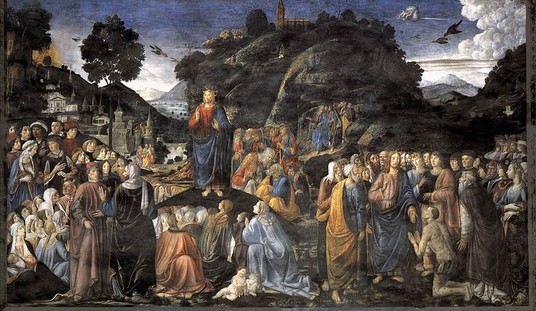This morning’s Gospel reading is Mark 4:26–34:
Jesus said to the crowds:
“This is how it is with the kingdom of God; it is as if a man were to scatter seed on the land and would sleep and rise night and day and through it all the seed would sprout and grow, he knows not how. Of its own accord the land yields fruit, first the blade, then the ear, then the full grain in the ear. And when the grain is ripe, he wields the sickle at once, for the harvest has come.”
He said, “To what shall we compare the kingdom of God, or what parable can we use for it? It is like a mustard seed that, when it is sown in the ground, is the smallest of all the seeds on the earth. But once it is sown, it springs up and becomes the largest of plants and puts forth large branches, so that the birds of the sky can dwell in its shade.” With many such parables he spoke the word to them as they were able to understand it. Without parables he did not speak to them, but to his own disciples he explained everything in private.
It’s one of the most famous courtroom scenes in American films. Tom Cruise and Jack Nicholson square off in A Few Good Men, one defending two men accused of murder and the other defending a country while keeping a dark secret. In the emotional climax of the 1992 classic, Cruise’s Lt. Kaffee demands to know whether Nicholson’s Col. Jessup ordered the “code red” that led to the death of a Marine in Guantanamo.
“You want answers?” snarls Jessup.
“I want the truth!” Kaffee snaps back.
“You can’t handle the truth!” roars Jessup in an iconic moment.
In the end, however, it’s Jessup that can’t handle the truth. Nor, in some ways, could the two defendants handle the truth, nor the court or prosecutor. In fact, it turns out that no one involved could really handle the whole truth — about the world, and perhaps especially about themselves. A Few Good Men is a film that deals in blind spots, the damage they do, and the difficulty that everyone has in recognizing and dealing with them.
This comes to mind in today’s Gospel, although not from the well-known parable of the mustard seed. It comes from the use of parables in general. “With many such parables,” Mark writes, “He spoke the Word to them as they were able to understand it.” The chosen disciples got more direct explanations of Jesus’ preaching, but they were formed well enough to handle the truth.
Without that indirectness, the rest of the people couldn’t handle it. We see this in John 6, when Jesus tells the “great crowd” that follows him at the Sea of Galilee. The very next day after the miracle of the loaves and fishes, the crowd asks what is required of them. Jesus tells them not to worry about food of the earth but to eat of the eternal bread which will sustain them. When they ask Jesus to provide the bread, He replies in an unvarnished teaching shorn of parables:
Jesus said to them, “Very truly I tell you, unless you eat the flesh of the Son of Man and drink his blood, you have no life in you. Whoever eats my flesh and drinks my blood has eternal life, and I will raise them up at the last day. For my flesh is real food and my blood is real drink. Whoever eats my flesh and drinks my blood remains in me, and I in them. Just as the living Father sent me and I live because of the Father, so the one who feeds on me will live because of me. This is the bread that came down from heaven. Your ancestors ate manna and died, but whoever feeds on this bread will live forever.” He said this while teaching in the synagogue in Capernaum.
What happened when Jesus stopped teaching in parables? The people couldn’t handle the truth. Most of them walked away from Jesus, and even the disciples seemed shaken by the import of Jesus’ words. At first, they appear to expect to hear an explanation of this as a parable, but Jesus clearly meant it in substance. Peter finally declares when asked if he and the others would walk away, “Lord, to whom will we go? You alone have the words of eternal life.”
Even at that point, however, Peter wasn’t prepared for the whole truth. Still ahead was Peter’s denunciations of Jesus during the Passion and his need for forgiveness from the risen Christ. Until Pentecost and the coming of the Holy Spirit, the disciples could not become apostles and begin the work of the Great Commission.
Thanks to that work, we are better prepared for the truth, but few of us can handle all of it. We fall back into sin, we transgress, we reject the teachings of Christ just as the crowd did at Galilee — when the truth becomes too uncomfortable. We can’t handle the truth, something we prove over and over again both as individuals and as a whole.
Fortunately for us, we have a loving Savior who understands that better than we do. He gave us these parables not just to teach but as a way to provide hope and enough understanding to grasp the principle of salvation. Even if we cannot fully handle the truth here, we can grasp enough of it to repent and to learn. We can form ourselves over the years to be prepared for the Truth when it comes in the next life. It is enough to understand is that we are all the children of God, called to Him to be disciples of the Word, and to have faith — even a humble faith — that God loves us completely.
That is the mustard seed which eventually lifts us up by its branches to the Truth. We will need no parables when we get there, but we should bless Jesus with our gratitude for them along the way.
The front-page image is “The Parable of the Blind Leading the Blind” by Abel Grimmer, 17th century. Via Wikimedia Commons.
“Sunday Reflection” is a regular feature, looking at the specific readings used in today’s Mass in Catholic parishes around the world. The reflection represents only my own point of view, intended to help prepare myself for the Lord’s day and perhaps spark a meaningful discussion. Previous Sunday Reflections from the main page can be found here.








Join the conversation as a VIP Member